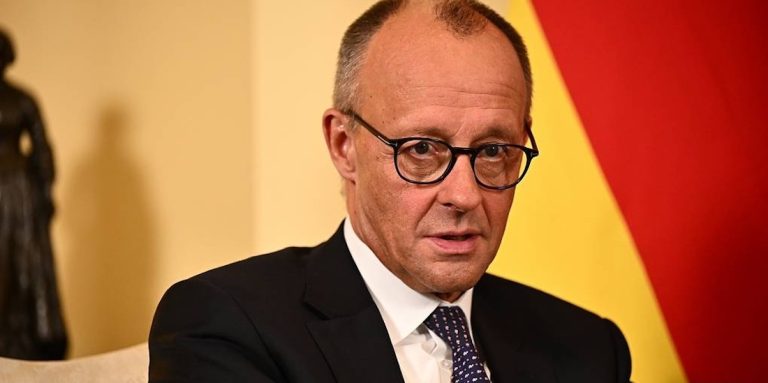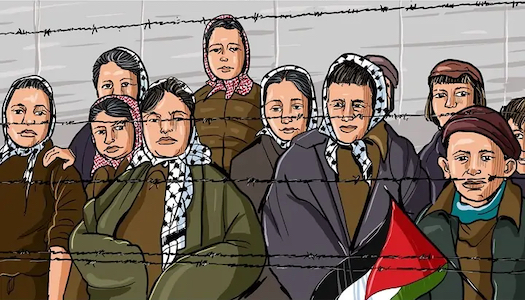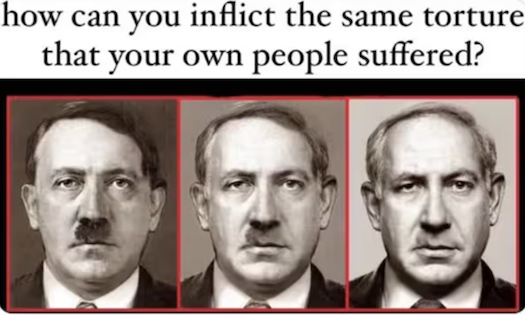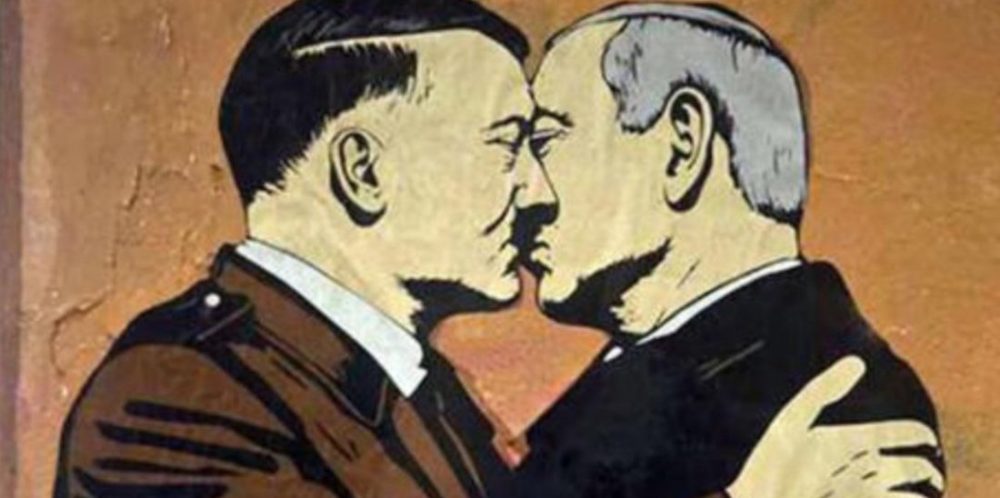
Friedrich Merz Maintains Traditional German Stance While European Leaders Push Palestinian Statehood Recognition
New York, N.Y. – Germany’s unique historical relationship with Israel continues to shape its foreign policy responses to the ongoing Gaza conflict, as Chancellor Olaf Scholz and opposition leader Friedrich Merz navigate the complex intersection of historical responsibility and contemporary geopolitical pressures.
While European counterparts like Emmanuel Macron and Keir Starmer — and now Canadian leadership — have made high-profile calls for Palestinian statehood recognition, Germany maintains its traditional approach rooted in unwavering support for Israel’s security and rejection of genocide accusations.
Germany’s Nazi past creates profound barriers to criticizing Israel, with leaders like Friedrich Merz and
Olaf Scholz consistently rejecting genocide accusations against Israel while maintaining support for a
two-state solution. Unlike Macron and Starmer, German politicians prioritize Israel’s security needs over
immediate Palestinian statehood recognition, reflecting historical guilt and political consensus. This analysis
explores how Germany’s Holocaust legacy shapes contemporary Middle East policy amid the Gaza crisis.
Historical Responsibility as Foreign Policy Foundation

Germany’s relationship with Israel operates under the principle of “Staatsräson“ – reason of state – making support for Jewish life and Israel’s existence a fundamental cornerstone of German foreign policy.
This commitment, born from the Holocaust and Nazi crimes, creates what officials describe as a “unique and profound responsibility” that transcends typical diplomatic relationships.
The historical burden manifests in Germany’s adoption of the International Holocaust Remembrance Alliance definition of antisemitism, which explicitly includes comparing Israeli actions to Nazi crimes as a form of antisemitic rhetoric.
This framework fundamentally shapes how German leaders approach criticism of Israeli policy.
While Germany does critique specific actions such as settlement expansion or excessive civilian casualties, the accusation of genocide represents what officials consider a “red line” that invokes dangerous Holocaust inversion.
The sensitivity extends beyond mere political calculation to encompass moral and cultural imperatives that define modern German identity and international standing.
Merz’s Position Within German Consensus

Friedrich Merz, leader of the Christian Democratic Union and prominent opposition figure, embodies the broad German consensus on Israel-Palestine policy.
His position reflects continuity with decades of CDU policy under leaders like Angela Merkel, emphasizing Israel’s right to self-defense while supporting humanitarian measures for Palestinian civilians.
Following the October 7th attacks, Merz has consistently backed Israel’s military response against Hamas while rejecting international pressure to apply the genocide framework to Israeli actions in Gaza.
The CDU leader’s approach differs markedly from recent statements by French President Emmanuel Macron and British Prime Minister Keir Starmer, who have explicitly linked calls for Palestinian state recognition to the destruction witnessed in Gaza.
Merz maintains that immediate priorities must focus on Hamas’s dismantlement, hostage releases, and Israel’s security before advancing Palestinian political aspirations. This position aligns with both current government policy under Chancellor Scholz and historical German approaches to the conflict.
The definition of “Antisemitism,” according to the
International Holocaust Remembrance Alliance
includes comparing Israeli actions to Nazi crimes.
No matter what Israel does, it cannot be criticized.
European Divergence on Palestinian Statehood
The contrast between German restraint and growing European momentum toward Palestinian recognition reflects broader shifts in international opinion following the Gaza conflict.

Countries including Spain, Ireland, and Norway have formally recognized Palestinian statehood, while leaders like Macron and Starmer have framed such recognition as an urgent response to Gaza’s humanitarian crisis.
These developments create diplomatic pressure on Germany to reconsider its traditional approach of linking Palestinian statehood to negotiated agreements between the parties.
However, German officials argue that premature recognition could undermine prospects for sustainable peace by removing incentives for Palestinian compromise in future negotiations.
This position reflects broader German preferences for structured, multilateral approaches to international conflicts, emphasizing institutional frameworks and negotiated settlements over unilateral recognition.
The stance also aligns with United States policy, which continues to tie ceasefire agreements to hostage releases and Hamas’s military defeat.

A mural depicting Prime Minister Benjamin Netanyahu kissing Nazi dictator Adolf Hitler, painted on the walls of a high school in Rome, has sparked outrage as criticism of Israel in Europe intensifies amid the ongoing war in Gaza. The mural, titled “The Final Solution,” was created by Laika, a well-known Italian street artist, according to the newspaper La Repubblica. The artwork shows Hitler embracing Netanyahu and congratulating him on the handling of the conflict in Gaza.
Limits of German Criticism

While Germany maintains strong support for Israel, its officials do engage in measured criticism of specific policies deemed counterproductive or harmful.
Chancellor Scholz and Foreign Minister Annalena Baerbock have criticized settlement expansion, called for increased humanitarian aid to Gaza, and urged Israeli compliance with international humanitarian law.
These positions demonstrate that German support for Israel is not unconditional, even as it remains fundamentally committed to Israeli security and existence.
The boundaries of acceptable criticism reflect careful calibration between historical responsibility and contemporary diplomatic needs.
German officials can address specific policy disputes while avoiding language or frameworks that might be interpreted as questioning Israel’s legitimacy or comparing its actions to historical Nazi crimes.
This approach allows Germany to maintain credibility as a mediator while preserving its special relationship with Israel and its commitment to combating antisemitism.
Gaza’s Impact on German Policy Calculations
The scale of destruction and civilian casualties in Gaza has intensified international pressure on traditional Israeli allies, including Germany, to reconsider their positions. However, German responses have emphasized humanitarian assistance and civilian protection rather than fundamental policy shifts.
Officials argue that Hamas’s use of civilian infrastructure and human shields creates moral complexity that prevents simple condemnation of Israeli military operations, even when civilian casualties are regrettable.
This analysis reflects broader German approaches to conflict assessment that emphasize legal frameworks and institutional responses over emotional or political reactions. German officials consistently frame the Gaza situation within contexts of international humanitarian law and self-defense principles rather than broader questions of occupation or liberation that animate much international criticism of Israel.
The approach allows Germany to maintain its supportive relationship with Israel while acknowledging humanitarian concerns.
Germany’s approach to the Israel-Palestine conflict remains fundamentally shaped by historical experiences that create unique constraints and responsibilities. Friedrich Merz and the CDU operate within this framework, supporting Israel’s security while maintaining theoretical commitment to two-state solutions without embracing immediate Palestinian recognition.
This position contrasts with evolving European approaches but reflects deep-seated German convictions about historical responsibility, antisemitism, and international law. As the Gaza conflict continues to reshape international opinion, Germany’s historical burden ensures that its policy responses will remain distinctively cautious and supportive of Israeli perspectives, regardless of broader diplomatic trends.
Casualties of the Israeli Invasion
Wikipedia keeps daily tabs on the ongoing deaths in Palestine (Gaza and the West Bank) and Israel, in English as well as other languages including German and Hebrew.

As of July 24, 2025, over 61,800 people have been reported killed in the “Gaza war” according to the Gaza Health Ministry and Israeli Ministry of Foreign Affairs, as well as 217 journalists and media workers, 120 academics, and over 224 humanitarian aid workers, a number that includes 179 employees of UNRWA.
These fatalities include 59,866 Palestinians (97%), 1,983 Israelis (2%), and third parties (1%). Scholars have estimated 80% of Palestinians killed are civilians.
A study by OHCHR, which verified fatalities from three independent sources, found that 70% of the Palestinians killed in residential buildings or similar housing were women and children.
Germany’s Historical Burden Shapes Israel Policy Amid Gaza Crisis (July 30, 2025)